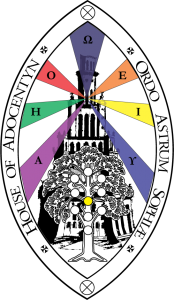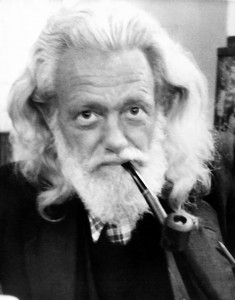As it did in 2002, in 1957 the Aurum Solis underwent a schism. In the ’50s this split was due to the popularity of Masonic-style rituals such as those typified by the Hermetic Order of the Golden Dawn. Those in favor of adopting a more Masonic approach to ritual left the Aurum Solis to form the Hermetic Order of the Sacred Word, or Ordo Sacri Verbi (OSV). In 1959 a remarkable man by the name of Ernest Page became the Warden of the OSV.
Ernest Page would also become a mentor to a young Leon Barcynski (Osborne Phillips) before his death in 1966, but ever since he was a young man he had a passion for poetry. One of his poems is published in The Magical Philosophy, while another has been presented by the Astrum Sophia in issue 4 of the Ogdoadic Journal. Within the archives of the Astrum Sophia are contained some of his additional works, including the simply titled XIV Poems and a rare, delicately hand-bound booklet of poetry from Page’s involvement with a group of British poets known as The Saturdays (donated to the OAS by the last surviving member of the group). A favorite pastime of The Saturdays was to compose poems on a theme within the short span of 15 minutes. Here is one of those poems:
The Bridge by Ernest Page
Seeker of faery gold, what has set fire to your eyes?
– A bridge of colours seven, and I ride to Paradise.
Seeker, the bridge is faery, and bears neither steed nor men
– I ride seven years and a day, for I will cross it, and can.
Seeker, your vision is true, and your high-held heart is wise,
But you must walk under the bridge if you would find Paradise.22nd May 1946
Ernest was also the subject of a poem himself, composed by his contemporary, A.C. Jacobs. His Collected Poems & Selected Translations (Menard Press: 1996) provides the context for this poem: “This description fits the astrologer Ernest Page who frequented the Soho coffee houses in the 1950s, and charged three shillings and sixpence for a consultation.”
The Astrologer by Arthur Jacobs
His flat and battered notebook
Is like grey parchment with symbols
Scrawled in its dust out of Babylon.He will set, for three and sixpence,
Round your magic hour of birth
The stars that in their movementsTell him the secrets your appearance
Chose for itself. He is no crank,
But a true survival from an ancientArt that promises trends, not detailed
Incident. Consult him at your peril:
For whether or not his assured visionExcites the protest of your intellect,
Past and future turn before his gaze,
Mortality lies naked beneath his fingertips.

